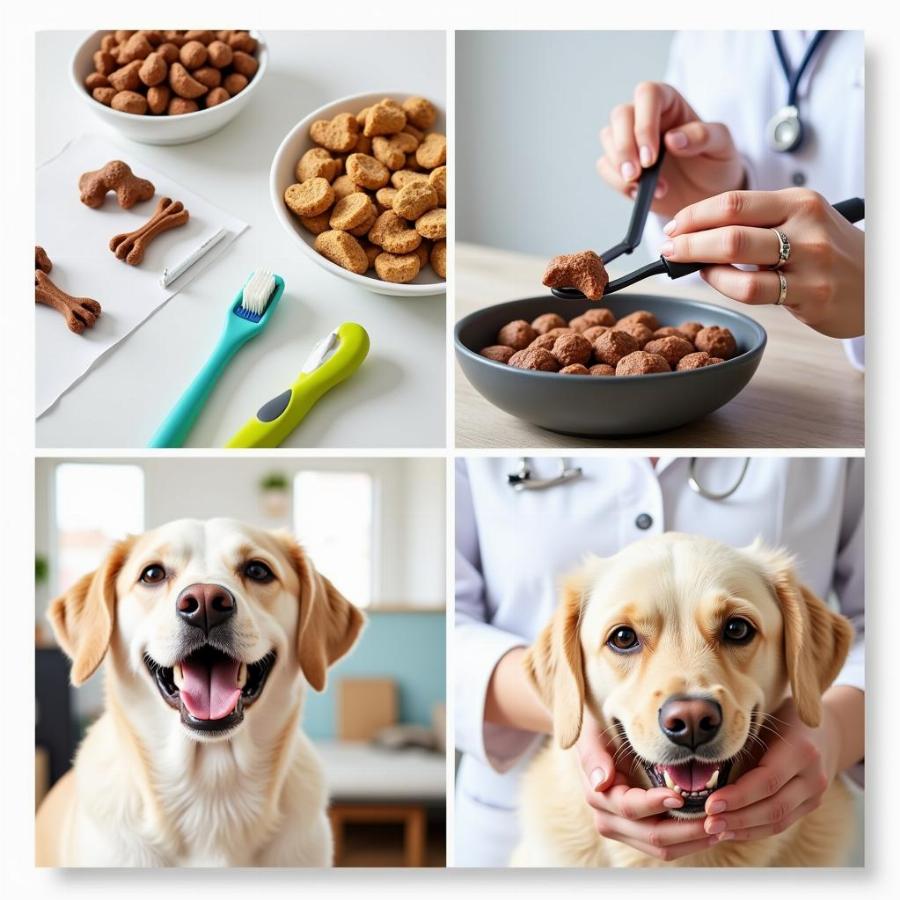Cloves for dogs – a topic that often sparks concern and curiosity among pet owners. While this aromatic spice is a staple in many kitchens, its use with our canine companions requires careful consideration. Is it safe? Are there benefits? This comprehensive guide will delve into everything you need to know about cloves and dogs, exploring the potential risks, purported benefits, and offering clear guidance on safe usage.
Understanding the Potential Risks of Cloves for Dogs
While cloves possess certain properties that some believe offer health benefits, they also contain a compound called eugenol, which can be toxic to dogs in large amounts. Eugenol can cause a range of adverse reactions, from mild gastrointestinal upset to more serious issues like liver damage. This is why it’s crucial to understand the potential risks before considering using cloves with your furry friend.
Gastrointestinal Upset
One of the most common side effects of clove ingestion in dogs is gastrointestinal distress. This can manifest as vomiting, diarrhea, loss of appetite, and abdominal pain.
Liver Damage
In larger doses, eugenol can cause liver damage in dogs. This is a serious concern and requires immediate veterinary attention. Symptoms of liver damage can be subtle, but may include jaundice (yellowing of the skin and gums), lethargy, and increased thirst.
Neurological Effects
High concentrations of eugenol can also affect the nervous system, leading to symptoms such as tremors, seizures, and even coma. These are severe reactions and highlight the importance of caution when it comes to cloves and dogs.
Are There Any Benefits of Cloves for Dogs?
Despite the potential risks, some believe that cloves offer certain health benefits for dogs, primarily due to their antiseptic and analgesic properties. However, these claims are largely anecdotal and lack scientific backing. cloves and dogs It’s essential to consult with a veterinarian before using cloves to treat any health issues in your dog.
Pain Relief
Some pet owners use clove oil topically to alleviate pain associated with dental issues or arthritis. However, the effectiveness and safety of this practice are not well-established. Applying clove oil directly to a dog’s skin can cause irritation and should be avoided.
Dental Health
Cloves are sometimes touted for their potential to improve dental health in dogs due to their antiseptic properties. However, the risks associated with ingestion outweigh any potential benefits, and there are safer, more effective ways to maintain your dog’s oral hygiene.
Can Dogs Eat Cloves? A Definitive Answer
The simple answer is: No, dogs should not eat cloves. The risks associated with clove ingestion, particularly the potential for liver damage and neurological effects, outweigh any purported benefits. While a tiny amount of clove might not cause immediate harm, it’s best to avoid giving cloves to your dog altogether. are cloves bad for dogs
Safe Alternatives for Dog Health
Instead of relying on cloves, numerous safe and effective alternatives can support your dog’s health and well-being.
- For pain relief: Consult with your veterinarian about appropriate pain medications.
- For dental health: Regular brushing, dental chews, and professional cleanings are the best ways to maintain your dog’s oral hygiene.
- For overall health: Provide a balanced diet, regular exercise, and routine veterinary care.
 Chăm sóc sức khỏe chó cảnh
Chăm sóc sức khỏe chó cảnh
Conclusion
While the aroma of cloves might be enticing, they pose significant risks to our canine companions. It’s crucial to prioritize your dog’s safety and avoid giving them cloves in any form. Instead, focus on proven methods to maintain their health and well-being, and always consult with your veterinarian before introducing any new remedies or supplements. Remember, keeping your dog safe and healthy is the ultimate spice of life!
FAQ
- What should I do if my dog eats a clove? Contact your veterinarian immediately.
- Are clove-flavored treats safe for dogs? No, even clove-flavored treats can contain enough eugenol to be harmful.
- Can I use clove oil to repel fleas on my dog? No, clove oil can be toxic when applied to a dog’s skin. Use a vet-approved flea repellent instead. homemade bug repellent for dogs
- Are there any dog breeds more susceptible to clove toxicity? Smaller dogs are generally more susceptible to toxins due to their size.
- Are ground cloves more dangerous than whole cloves? Both forms of cloves are dangerous for dogs due to the presence of eugenol.
- Can I give my dog pumpkin spice treats that contain cloves? No, pumpkin spice often contains cloves and should be avoided. pumpkin cake for dogs
- Are clove supplements safe for dogs? No, avoid giving your dog any supplements containing cloves. liver supplements for dogs
Beaut Dogs is your trusted source for all things canine, offering expert advice and valuable insights into the world of dog care. From breed information to health tips, we’re dedicated to providing you with the knowledge you need to ensure your furry friend thrives. When you need support, feel free to contact Email: [email protected] to get detailed and accurate answers from Beaut Dogs.